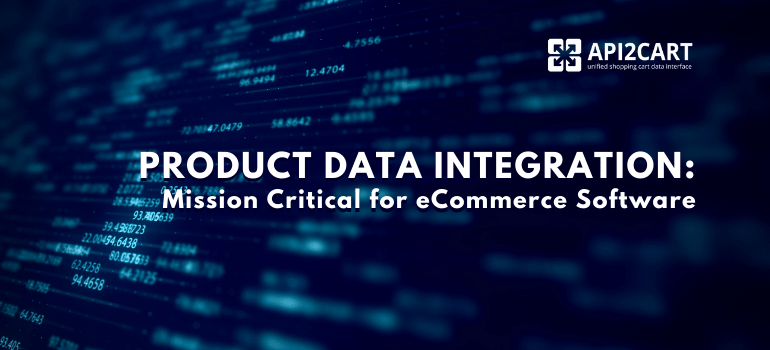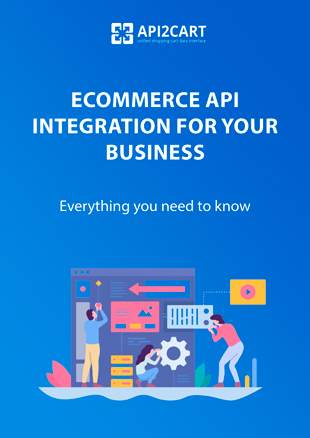
Product data is used in almost every aspect of the eCommerce business. It’s what buyers take into consideration during their decision-making process. It’s what the retailers use to create the first impression on their customers. And finally, it’s what most of the eCommerce software is built on. Product data has always been the core of all types of sales, inventory management, order, dropshipping, warehouse, repricing systems, etc. Let’s see how these data are used in eCommerce software industries.
The Usage of Product Data in Different eCommerce Spheres
Product data is vastly used by B2B eCommerce software services. Let’s examine some of the cases in detail:
- Order and Inventory Management Software
The major functions of the order and inventory management systems are performed with the usage of the e-store data such as product, order and customer information. If the B2B systems are integrated with the customers’ shopping carts, they get access to the product data and can run the following functions:
- Build and manage orders;
- Forecast the inventory levels;
- Establish shipping details (for instance: names, addresses, shipping facilities, etc.);
- Draw up the reports.
Keeping track of customers, accounts, billing and inventory levels proves the need for real-time product data access which is stored on shopping carts. Thus, the establishment of the order and inventory system requires setting up the number of vital connections.
- Warehouse Management System
Warehouse Management Systems (WMS) cover an extensive range of tasks, such as inventory management, handling the transactions, taking orders, etc. The main asset for the WMS providers is their customers’ e-shops, where all the necessary data is stored. The access to the consumers’ product data provides the WMS vendors with the following options:
- Track the products;
- Organize warehouse operations;
- Boost order fulfilment speed and accuracy;
- Make in-depth reports;
- Perform inventory updates.
Thus, in order to process the customer’s requests, there is the need to have the product data at your fingertips which becomes possible via integration.
- Dropshipping Automation Software
The retailer's’ e-shops as the source of data are extremely valuable for the dropshipping automation software vendors. The unlimited access to the product data, gives the B2B eCommerce software a bunch of possibilities:
- Import products, prices, customers and other info;
- Make feeds;
- Create product catalogs;
- Make real-time updates;
- Control inventory levels;
- Migrate data feeds to dropshippers’ systems.
Consequently, the proper running of these functions totally depends on the integration with the retailer’s shopping carts.
- Mobile Commerce App Builders
Building a mobile app for e-shop or any other eCommerce project requires establishing the connections between the mobile app and customer’s e-store. In this way, the synchronization of all the needed data is guaranteed. Having access to the product data of the retailers’ e-stores provides the mobile app builders with the ability to do the following:
- Displaying products with images and descriptions;
- Synchronizing data between the web-store and mobile app;
- Keeping up with inventory levels;
- Making all sorts of updates, and other.
In order to perform all these actions, there is the need for integrating with retailer’s shopping carts.
Challenges of Product Data Integration
Data is the power that drives business development and provides it with plenty of possibilities. Getting ongoing access to the product data involves the integration with the shopping cart. In other words, there is a need to set up a connection between the eCommerce software and the shopping carts’ database. This procedure would be relatively endurable if there were only one shopping cart. However, the fact is that the merchants run their e-shops on different shopping carts. As a result, there is the need to be connected to the shopping platforms retailers build their shops on. Therefore, the integration turns out to be an extremely painful process due to a number of reasons:
- integration with each eCommerce platform costs thousands of dollars;
- it takes about a month to complete one integration. For SaaS app providers it is recommended to have multiple integrations. However, waiting for each one of them to be developed and tested correctly may cost you the thousand of potential client;
- it is challenging to cope with the integrations when the shopping platforms upgrades. You may face the loss of information or incorrect data retrieved. Also, you have to spend a lot of time on changing your own code;
- there are a lot of difficulties with APIs of some of the shopping platforms and marketplaces. For example, Amazon API is really old and its API Docs are really complicated and sometimes don’t provide all the necessary information. Magento API integration also isn’t so easy because of the inaccuracy of its API Docs. Lack of Etsy API documentation can cause extra development time and investigations and its API behavior can be changed without notification;
- eCommerce data integration requires highly skilled developers with expert technical knowledge. Such developers are hard to find, as a robust integration is embedded with significant technological complexities;
- the manual development of integrations can cause serious security threats to your system. If the connections are weak, your SaaS application may be prone to malicious users who could try to end up with data theft.
It may take a month and a few thousands of dollars to establish only one connection, not even to mention its further updating and upkeep.
Product Data Integration: Workaround
Fortunately, there is an effective way out of all these product data integration challenges. API2Cart is a solution that allows eCommerce software vendors to connect to various platforms much easier. This service provides an API to integrate with 40+ shopping carts such as PrestaShop, Shopify, Magento, BigCommerce, OpenCart, Lightspeed, Ecwid, etc. This not only saves you months of work and significant financial resources but also provides scope for working on other important integrations. You will be also able to manage data connected with products, orders, categories, shipments, and customers. API2Cart’s flexible infrastructure enables adding an unlimited number of clients’ stores, considering all the unique business needs and demands. Both static and interactive docs are presented to outline patterns on how to work with the service.
In case you are interested in integrating your B2B system with numerous shopping carts, then schedule a consultation with our representative or you can try how API2Cart would work for your business right away.



